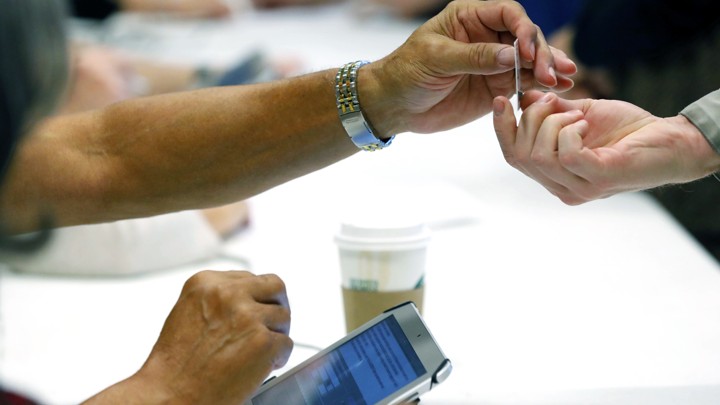Zimbler0:
Re: âLet me say right up front that I hate douche bag web sites. This is one of them. It won't let me copy and paste from it.â
That's strange. I've run into that before, but it didn't happen for me with your article. Are you using Mozilla? I'm using Firefox Quantum 63.0.1 (64-bit).
Here's your article.
February 18, 2017
How Voter ID Laws Discriminate
A new comprehensive study finds evidence that strict voting laws do suppress the ballot along racial lines.
Vann R. Newkirk II
TheAtlantic.com

For all the fervor of the current debate over voter ID laws, thereâs a startling lack of good data on their effects. As of the 2016 election, 33 states have a voter identification law, with 12 of those considered âstrictâ requirements.
After the 2013 Shelby County v. Holder Supreme Court case weakened federal oversight over state and county election laws, the debate over whether these and other more restrictive laws have discriminatory effects has mostly been waged in the realms of ideology and intent, with most existing studies relying on data limited by time, place, or bias.
The catch-22 of course is that the laws have to be passed and solidly in place first to have robust longitudinal data on their effects, which in this case would mean potentially discriminatory effects would have already impacted elections. A new study from researchers Zoltan Hajnal, Nazita Lajevardi, and Lindsay Nielson at the University of California San Diego is one of the first to analyze certified votes across all states after the implementation of voter laws in multiple elections, and it found just that kind of racially discriminatory impact.
Specifically, they found âthat strict photo identification laws have a differentially negative impact on the turnout of Hispanics, Blacks, and mixed-race Americans in primaries and general elections.â
The authors note that the existing research tends to point to three things: that strict voter ID laws requiring identification to cast a ballot do in fact reduce turnout by some amount, that turnout reduction tends to work in Republicansâ favor, and that differential effects have been observed along class and education lines, but not race. But the UCSD researchers call those conclusions into question, noting that analyses based on elections data before 2014 could not have collected comprehensive enough data to rule out racial suppression, and that analyses that sidestep that limitation by relying on survey data tend to fall victim to people of color over-reporting if they voted in prior elections.
According to the new study, the new approach addresses these problems by assessing nationwide votes in the 2008 and 2012 primary and general elections using responses from the Cooperative Congressional Election Studies, a large national survey that validates self-attestation of voting status with voting records. The researchers used this dataset to compare turnout in elections where strict voter ID had been implemented versus those where it hadnât, and measured the gap in turnout between races.
Using this refined methodology, researchers found that strict ID laws doubled the turnout gap between whites and Latinos in the general elections, and almost doubled the white-black turnout gap in primary elections. And given that their turnout models incorporate the known surge of turnout among minorities spurred by Barack Obamaâs candidacy, they might actually be underestimating the overall suppression effects of voter ID law. âI couldnât find a compelling way to control for the potential Obama effect and I do think his presence might have reduced the effect of voter ID laws in 2008 and 2012,â Hajnal said in an email. âAlthough in order for that to happen, Obamaâs effects on minority turnout would have to be especially pronounced in strict ID law states.â
In an article in the Washington Post summarizing their research, the authors expound on the political conclusions of their work:

By instituting strict voter ID laws, states can alter the electorate and shift outcomes toward those on the right. Where these laws are enacted, the influence of Democrats and liberals wanes and the power of Republicans grows. Unsurprisingly, these strict ID laws are passed almost exclusively by Republican legislatures.
Alone, those political effects might not matter. Existing legal precedent has allowed voting laws that have limited naked partisan advantage so long as they do not violate anti-discrimination law as outlined in the Voting Rights Act. So far, intent and proven racial disparities in access to ID have been the strongest arguments against implementing strict ID laws, and have worked in court in some limitedâand egregiousâcases.
But the UCSD study provides some of the first comprehensive evidence of the racially disparate impact of voter ID laws on voting outcomes, and adds to the growing body of data that voter suppression is the end-result of several Republican-led voting initiatives and contributes to their national partisan advantage. Again, the catch-22 is that if data does continue to accumulate to this effect, the discrimination will have already taken place.
http://www.theatlantic.com/politics/archive/2017/02/how-voter-id-laws-discriminate-study/517218/

Gold is $1,581/oz today. When it hits $2,000, it will be up 26.5%. Let's see how long that takes. - De 3/11/2013 - ANSWER: 7 Years, 5 Months
